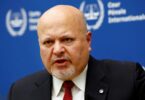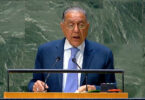CHISINAU (Reuters): Moldova’s Prime Minister on Wednesday named a new foreign minister and boosted his government team working on the country’s negotiations to join the European Union, a process opposed by local pro-Russia separatists.
Dorin Recean said that senior lawmaker Mihai Popsoi would replace Nicu Popescu as foreign minister following Popescu’s decision to resign. He also named Cristina Gerasimov as the head of a newly created Bureau for European Integration.
Recean said that both would start working from next week.
Moldova, the small former Soviet republic led by pro-European president Maia Sandu, was given the green light by the EU in December to open negotiations on joining the 27-nation bloc along with neighboring Ukraine. Both countries face a long process involving many changes and reforms to meet EU standards.
Popescu, the foreign minister since 2021, earlier announced his resignation, saying he had fulfilled his objective of steering the country towards the EU and “needed a pause”.
Analysts praised Popescu’s role in supporting Sandu’s efforts to move the country closer to the EU and said he was resigning to spend more time with his family living in France.
His replacement Popșoi is a deputy parliamentary speaker and has been in parliament since 2019.
Gerasimov, the state secretary at the foreign ministry, also worked as Sandu’s foreign policy adviser.
Sandu’s approval is required to finalize the appointments.
The new appointees take over at a sensitive time for Moldova, where a duty on imports and exports introduced in the New Year were met this week by a call from pro-Russian separatists in its Transdniestria region for military readiness.
Sandu has denounced Russia’s invasion of Ukraine and accused Moscow of plotting a coup to oust her. The Kremlin says she is fomenting Russophobia.
Before Russia launched its invasion of Ukraine in February 2022, the bulk of Moldovan energy needs came from a single Soviet-era pipeline controlled by the Russian state-owned gas monopoly, Gazprom.
The Moldovan government took steps to reduce its reliance on Russian gas and strengthen its energy security.
Sandu has also said that Chisinau could press ahead with its bid to join the EU without Transdniestria, which split from Moldova before the collapse of Soviet rule and fought a brief war against the newly independent state lying between Ukraine and Romania.







